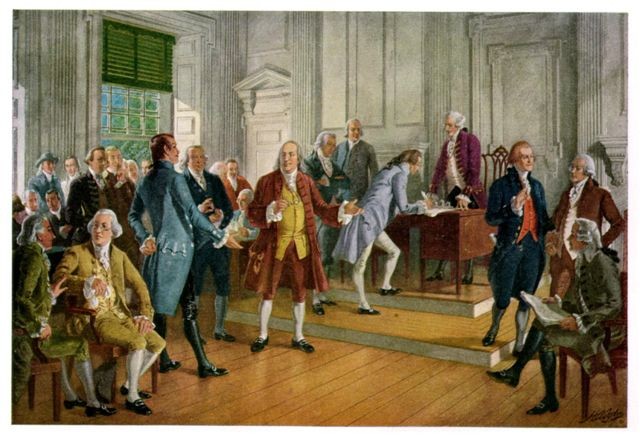Recently in class, I asked my students to discuss, analyze, and write about what they felt were the top 4 historical events (out of 15) that helped lead toward the Civil War. Of course, many students tried to get me to reveal my top 4 choices...I resisted the temptation to tell them my list (before the test) because I didn't want to influence their choices.
Here are my Top 4:
 |
| Signing of The Declaration of Independence (minus the Slavery Clause) |
1. July 4, 1776:The Founding Fathers did not eliminate slavery when they had a chance.
I believe Thomas Paine (and not Thomas Jefferson) may have written the famously omitted Slavery Clause:
He [King George III] has waged cruel War against human Nature itself, violating its most Sacred Right of Life & Liberty in the Persons of a distant People who never offended him, captivating & carrying them into Slavery in another Hemisphere, or to incur miserable death in their Transportation thither. This piratical Warfare, the opprobrium of infidel Powers, is the Warfare of the Christian King of Great Britain. He has prostituted his Negative for Suppressing every legislative Attempt to prohibit or to restrain this execrable Commerce, determining to keep open a market where MEN should be bought & sold, and that this Assemblage of Horrors might want no Fact of distinguished Die, he is now exciting those very People to rise in Arms among us, and to purchase that Liberty of which he has deprived them, by murdering the people upon whom he also obtruded them; thus paying off former Crimes committed against the Liberties of one People, with Crimes which he urges them to commit against the lives of another.
 |
| Battle of Chapultepec |
 |
| My student's awesome John Brown artwork |
4. The 1860 Election of Abraham Lincoln: The election of Abraham Lincoln (he was not on a single southern ballot...only 40% of the popular vote) served as the immediate catalyst for the outbreak of the American Civil War. Before Lincoln was inaugurated, seven Southern states seceded and formed the Confederate States of America...leading to the bombardment of Ft. Sumter on April 12, 1861.


No comments:
Post a Comment